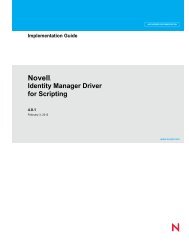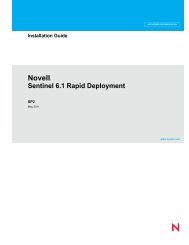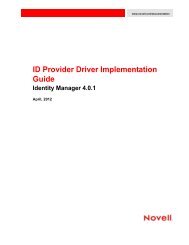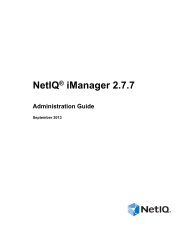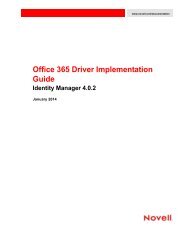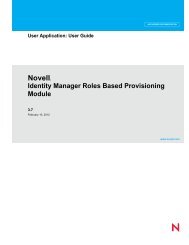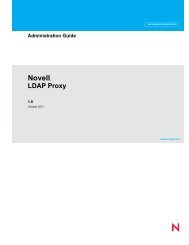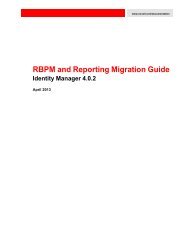Novell eDirectory 8.8 Troubleshooting Guide - NetIQ
Novell eDirectory 8.8 Troubleshooting Guide - NetIQ
Novell eDirectory 8.8 Troubleshooting Guide - NetIQ
Create successful ePaper yourself
Turn your PDF publications into a flip-book with our unique Google optimized e-Paper software.
19Miscellaneous<br />
• Section 19.1, “Backing Up a Container,” on page 93<br />
• Section 19.2, “Repeated <strong>eDirectory</strong> Logins,” on page 93<br />
• Section 19.3, “Enabling Event System Statistics,” on page 93<br />
• Section 19.4, “Tracking Memory Corruption Issues on Linux,” on page 93<br />
• Section 19.5, “TCP Connection not Terminating after Abnormal Logout,” on page 94<br />
• Section 19.6, “NDS Error, System Failure (-632) Occurs When Doing ldapsearch for the User<br />
Objects,” on page 95<br />
• Section 19.7, “Disabling SecretStore,” on page 95<br />
19.1 Backing Up a Container<br />
While using ndsbackup to backup a container that has many objects (like a million), it might take<br />
some time to get the list of the objects in the container and start their individual backup.<br />
19.2 Repeated <strong>eDirectory</strong> Logins<br />
Repeated <strong>eDirectory</strong> logins can use up the available memory. Disable the Login Update attribute<br />
using ndsimonitor to overcome this problem.<br />
19.3 Enabling Event System Statistics<br />
Time related statistics are maintained for every event thrown and consumed in <strong>eDirectory</strong>. This<br />
information is useful for troubleshooting event consumer issues. These statistics are not required for<br />
normal functioning of directory; therefore, they are disabled for performance reasons. Event<br />
statistics can be enabled at runtime by using iMonitor advanced configuration parameters.<br />
To view the event statistics, set the ENABLE_EVENT_STATISTICS parameter and restart the<br />
server . It is a permanent configuration parameter.<br />
19.4 Tracking Memory Corruption Issues on<br />
Linux<br />
On Linux platforms, <strong>eDirectory</strong> uses google malloc (libtcmalloc) as the default memory allocator.<br />
To track memory corruption issues, set the MALLOC_CHECK_ environment variable in the<br />
ndsd startup script. The startup script checks for this variable. If set, the default system malloc is<br />
used, else google malloc is loaded.<br />
19<br />
novdocx (en) 11 July 2008<br />
MALLOC_CHECK Settings in ndsd<br />
• When MALLOC_CHECK_ is set to 0, any detected heap corruption is silently ignored.<br />
• When MALLOC_CHECK_ is set to 2, abort is called immediately.<br />
Miscellaneous<br />
93




